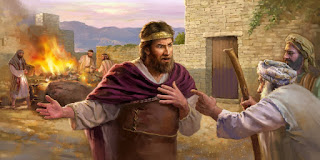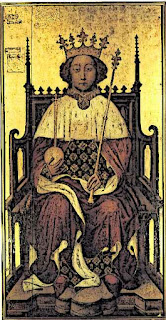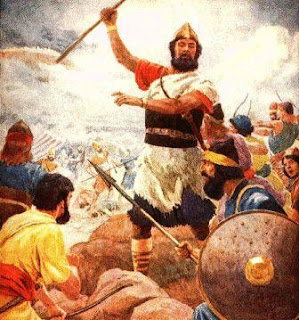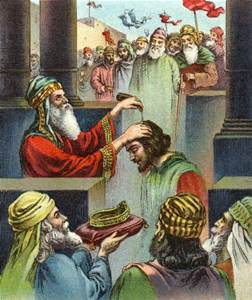"The one perfectly divine thing, the one glimpse of God's paradise given on earth, is to fight a losing battle -- and not lose it." - G.K. Chesterton
David versus Goliath. Probably one of the most recognized stories in all of Scripture. It's a story nearly everyone knows, whether it was encountered in the Bible or not. Even reading it as just another episode in the grand chronology of Scripture, there's something unique and special that stands out about it. The previous chapter, when David is divinely chosen as the next king and is anointed, seems to pale in comparison to the events of this chapter. It's as if God wanted to make David's entrance in the story as dramatic and unforgettable as possible. But there are similarities between Chapters 16 and 17 -- in the former chapter it is said that God values what's in the human heart, not physical or outward stature and strength. Then, as if to vividly illustrate that idea, in the latter chapter we see the small, young David defeat the literal giant Goliath! God shows us all that with Him all things are possible. He shows us that even if the odds are against us, or the enemy seems stronger, He has the ultimate say in who will be victorious. And making the victor a humble shepherd only serves to illustrate more profoundly to whom all power truly belongs. Chapter 17 also serves to make the line between Saul and David more clearly visible. God is not with Saul; it is more evident than ever. Saul cannot save the Israelites; he lacks the courage even to stand up to Goliath. God's grace and power is with David now. And it is David's faith that proves more valuable and powerful than the strength of an entire army. David says, "...the Lord saveth not with sword and spear" (1 Samuel 17:47). And earlier: "Thou comest to me with a sword, and with a spear, and with a shield: but I come to thee in the name of the Lord of hosts..." (1 Samuel 17:45). This emphasis on faith in God over and above weapons and armor and material displays of strength is quite profound. David is almost ushering in here a new theology, i.e., a deeper understanding of God. The Israelites had clamored for a king, someone who could be a source of strength and power here on earth and save them from their enemies. David, though, comes to remind them that their strength and power needs to come from faith in God and a firm commitment to uphold His commandments. He may be a king just like Saul, but he's a different kind of king. David sings the praises of God, and shows the people what faith looks like. It's no wonder the Christian kings of later centuries and eras looked to him as their role model.
One man's literary pilgrimage through the hills and valleys of the Word of God.
Wednesday, June 26, 2019
Tuesday, June 25, 2019
1 Samuel 16: The Lord Chooses David
There have been hints at his coming, but finally in this chapter we meet for the first time David, future king of Israel. David is right up there with Moses and Abraham as one of the few towering figures of the Old Testament. He marks a coming shift for God's chosen people -- a covenantal shift. With Saul we've seen the shift to a monarchical government, but with David we'll see the true fullness of that shift, as David will be the greatest king Israel will ever know, and that greatness will make his kingship a model for generations and centuries to come. There are also the symbols and figures of David's kingship. Much of Jesus Christ's teachings hearken back to David's reign, showing how it was a type of the eternal heavenly kingdom of which Jesus came to tell us. I simply pause to reflect on the significance of David before I begin reading his chapters in Scripture, for his entrance marks the beginning of a new and momentous era for the Israelites. And furthermore, there is the unavoidable symbolism of God's favor passing from Saul to David. Saul was chosen first by God, as were the Jews, but Saul proved obstinate and unfaithful and so God abandoned him, and instead sought out the lowly and unassuming shepherd David. David is the church of Christ, which began humble and small but ultimately flowered into a glorious regal and spiritual power. This is the symbolic example that is repeated over and over in Scripture, and the figures of Saul and David probably illustrate the supersession most vividly of all; for the Jews sought a worldly power, a kingdom full of outward strength and glory, much like Saul. Instead, God sent His Son, a poor carpenter, who exuded strength via spirituality and taught us how to pray, much like David.
A couple of important things of note in 1 Samuel 16:
1) The significance of God's emphasis of heart versus appearance. In 1 Samuel 16:7 it is said: "Look not on his countenance, nor on the height of his stature: because I have rejected him, nor do I judge according to the look of man: for man seeth those things that appear, but the Lord beholdeth the heart." This seems like such a revolutionary idea. In an era when tribal warfare was constant, outward strength and power was everything. We see this with Saul, who was a towering and commanding figure based on appearance alone. But he proved inept in God's eyes. By choosing David, God is telling us that He doesn't care much about outward appearances the way we do. We, being confined to our senses, tend toward superficiality. But God sees the hearts of men. He saw in David faithfulness and other virtues that we might overlook for vain reasons. This is also why we must not judge other men, for only God truly knows their hearts.
2) Saul's descent into madness, evil, and despair, and David's healing harp. This whole notion is full of symbolic import. It seems obvious that at the same time God would abandon Saul, an evil presence would take up residence in him. For where God is absent, there surely are the devils. Saul's story is again a tragic one, though one he wrote himself. He has become a tormented figure, an example of one desperately clinging to his own pride and power and yet descending into despondency and desolation. But he discovers the music of David, which seems to heal him, at least temporarily. This also is a powerful symbol. We know David as the future author of the Psalms, the sacred prayers still sung today by God's faithful the world over. His music played on his harp is indicative of those prayers as they literally chase away Saul's demons. We see right away that David will become a much different kind of king than Saul. He has a spiritual heart, he is attuned to God's music, and he will show the world how to pray.
A couple of important things of note in 1 Samuel 16:
1) The significance of God's emphasis of heart versus appearance. In 1 Samuel 16:7 it is said: "Look not on his countenance, nor on the height of his stature: because I have rejected him, nor do I judge according to the look of man: for man seeth those things that appear, but the Lord beholdeth the heart." This seems like such a revolutionary idea. In an era when tribal warfare was constant, outward strength and power was everything. We see this with Saul, who was a towering and commanding figure based on appearance alone. But he proved inept in God's eyes. By choosing David, God is telling us that He doesn't care much about outward appearances the way we do. We, being confined to our senses, tend toward superficiality. But God sees the hearts of men. He saw in David faithfulness and other virtues that we might overlook for vain reasons. This is also why we must not judge other men, for only God truly knows their hearts.
2) Saul's descent into madness, evil, and despair, and David's healing harp. This whole notion is full of symbolic import. It seems obvious that at the same time God would abandon Saul, an evil presence would take up residence in him. For where God is absent, there surely are the devils. Saul's story is again a tragic one, though one he wrote himself. He has become a tormented figure, an example of one desperately clinging to his own pride and power and yet descending into despondency and desolation. But he discovers the music of David, which seems to heal him, at least temporarily. This also is a powerful symbol. We know David as the future author of the Psalms, the sacred prayers still sung today by God's faithful the world over. His music played on his harp is indicative of those prayers as they literally chase away Saul's demons. We see right away that David will become a much different kind of king than Saul. He has a spiritual heart, he is attuned to God's music, and he will show the world how to pray.
Friday, June 21, 2019
1 Samuel 15: The Last Straw
"He hath put down the mighty from their seat, and hath exalted the humble." (Luke 1:52)
Saul's time on the throne has come to an end. The events of 1 Samuel 15 are what finally do him in. And this chapter makes it clear that Saul's transgression, the very thing that separated him so dramatically from God, is disobedience. We've already seen how the crown had made Saul prideful and arrogant, but the greater crime, which obviously results from those vices, is how he disregarded God's commands. He made himself the ultimate judge and ignored the true Judge. In looking over Saul's brief reign, it doesn't immediately seem clear that he's done anything seriously egregious. But then in this chapter Samuel spells it out for us: "Doth the Lord desire holocausts and victims, and not rather that the voice of the Lord should be obeyed? For obedience is better than sacrifices: and to hearken rather than to offer the fat of the rams" (1 Samuel 15:22). For obedience is better than sacrifices. Saul wanted to make sacrifices to God in this chapter, and in previous chapters when he would perform the sacrifices himself rather than wait for the proper officiant. He felt that the sacrifice itself was what was important, and that it didn't matter who did it or in what way. His pride blinded him to the truth that he was grievously disobeying the specific orders of God -- just as Satan had done when he was cast from Heaven, just as Adam and Eve had done when they ate the fruit, just as all of us do when we think ignoring God's commands is no big deal. God doesn't need a sacrificed animal, He needs us to obey Him. In 1 Samuel 15 that meant Saul needed to kill all the Amalekites, including their king, Agag. This might be a hard matter for us to think on, but God's ways we must remember are mysterious. Saul does not kill all the Amalekites, and even spares the life of Agag, in direct disobedience and defiance of God's orders. He tries to make the excuse that he spared the animals in order to make sacrifices to God, but again as we've seen it wasn't the sacrifices God wanted but Saul's obedience. Why Saul didn't kill Agag isn't immediately clear. Was it a false pity? Was it so he could march the captured king back home as a sign of his triumph? Whatever the reason, Saul disobeyed God and was thus officially cast away as Israel's king. Samuel makes it clear by the end of the chapter that Saul is no longer God's chosen king. His last disobedience was the last straw.
Saul's time on the throne has come to an end. The events of 1 Samuel 15 are what finally do him in. And this chapter makes it clear that Saul's transgression, the very thing that separated him so dramatically from God, is disobedience. We've already seen how the crown had made Saul prideful and arrogant, but the greater crime, which obviously results from those vices, is how he disregarded God's commands. He made himself the ultimate judge and ignored the true Judge. In looking over Saul's brief reign, it doesn't immediately seem clear that he's done anything seriously egregious. But then in this chapter Samuel spells it out for us: "Doth the Lord desire holocausts and victims, and not rather that the voice of the Lord should be obeyed? For obedience is better than sacrifices: and to hearken rather than to offer the fat of the rams" (1 Samuel 15:22). For obedience is better than sacrifices. Saul wanted to make sacrifices to God in this chapter, and in previous chapters when he would perform the sacrifices himself rather than wait for the proper officiant. He felt that the sacrifice itself was what was important, and that it didn't matter who did it or in what way. His pride blinded him to the truth that he was grievously disobeying the specific orders of God -- just as Satan had done when he was cast from Heaven, just as Adam and Eve had done when they ate the fruit, just as all of us do when we think ignoring God's commands is no big deal. God doesn't need a sacrificed animal, He needs us to obey Him. In 1 Samuel 15 that meant Saul needed to kill all the Amalekites, including their king, Agag. This might be a hard matter for us to think on, but God's ways we must remember are mysterious. Saul does not kill all the Amalekites, and even spares the life of Agag, in direct disobedience and defiance of God's orders. He tries to make the excuse that he spared the animals in order to make sacrifices to God, but again as we've seen it wasn't the sacrifices God wanted but Saul's obedience. Why Saul didn't kill Agag isn't immediately clear. Was it a false pity? Was it so he could march the captured king back home as a sign of his triumph? Whatever the reason, Saul disobeyed God and was thus officially cast away as Israel's king. Samuel makes it clear by the end of the chapter that Saul is no longer God's chosen king. His last disobedience was the last straw.
Tuesday, June 18, 2019
1 Samuel 14: The Rashness of Saul
Yet again, in 1 Samuel 14 we see King Saul acting with pride, rashness, impatience, and overconfidence, putting his valiant son Jonathan's life at risk. And we also see a growing distance between Saul and God. Just as in the last chapter, it seems Saul has become puffed up as king. He feels superior to the prophets and the priests; he offers sacrifices himself without their aid. And in this chapter we see him making rash oaths. The seriousness of oaths and the dangers of making rash ones has been a prevalent theme so far in Scripture. One of the best examples was Jephte in Judges 11. Saul's oath in 1 Samuel 14 seems very similar to Jephte's. Both men put their children's lives at risk because of the thoughtlessness of their words. It's debatable whether or not Saul was acting in good faith purely. His pride most likely clouded his judgment. At any rate, it is notable that every time Saul seeks God's confirmation as to whether or not he's acting according to His will, he receives only silence. The implication is clear. God does not approve of Saul's actions, and furthermore God no longer even favors him as king, for His eyes have moved to David (though this hasn't been revealed to Saul yet). Each successive chapter of the First Book of Samuel reveals more clearly that Saul's reign has quickly become a tumultuous one full of missteps and blunders. Samuel himself doesn't appear at all in this chapter and one wonders if he has washed his hands of Saul and has moved on to God's chosen one, David. The tone of the text here is one of emptiness and disapproval. King Saul is losing his grip on his kingdom. The tale is a tragic one, for it's not that Saul appears evil or intentionally antagonistic toward God. But he does lack faith and humility and seems to trust himself more than anyone else -- more than God even.
Friday, June 7, 2019
1 Samuel 13: Saul Descends
Well that didn't last long. The reign of King Saul already appears to be nearing its end. It didn't take long for the regal power to begin corrupting Saul. And the defining moment that exemplifies this lamentable shift is in 1 Samuel 13 when Saul offers a sacrifice himself instead of waiting for the prophet Samuel to do so. It may seem like a trifling matter -- Samuel was, after all, late in arriving, and the people were growing increasingly nervous as the Philistine threat grew -- but it suggests that Saul's new role may be going to his head. There are also hints in this chapter that suggest the people may be losing confidence already in their new king. Saul may have been motivated by a fear that he was losing control and he needed to offer the sacrifice both to alleviate everyone's fear and also to demonstrate his absolute power. It's the latter matter that is more problematic. Saul demonstrates an audacity and a disregard for God's commands by circumventing the rules to just do the sacred action himself. It's only a first step, but it's a mode of thinking that, if left unchecked, could lead to terrible tyrannical actions. Saul doesn't exhibit much humility and pride is the sin most offensive to God. Which is probably why Samuel's condemnation of Saul is so harsh. I was surprised to see that even David's future kingship is foreshadowed in this chapter: "...thy kingdom shall not continue. The Lord hath sought him a man according to his own heart: and him hath the Lord commanded to be prince over his people, because thou hast not observed that which the Lord commanded" (1 Samuel 13:14). So there we have it. At this early point in Saul's reign, God has already chosen his replacement! Samuel already knows about David and foresees Saul's fall.
Taking into account God's larger plan, it's important to note how limited our own perspective can be. For those paying attention to Scripture, Saul's ascension to the throne may have been a matter of confusion and doubt. For in Genesis 49 it pretty clearly indicates that Judah's line will bear the scepter and rule over the other tribes. But Saul is a Benjamite. In hindsight, though, we can see that God knew Saul would transgress and lose his royal power. This opens the way for the scepter to pass to David of the house of Judah. God's plan, then, continues, and we are called to have faith in it, even at times of great confusion.
Taking into account God's larger plan, it's important to note how limited our own perspective can be. For those paying attention to Scripture, Saul's ascension to the throne may have been a matter of confusion and doubt. For in Genesis 49 it pretty clearly indicates that Judah's line will bear the scepter and rule over the other tribes. But Saul is a Benjamite. In hindsight, though, we can see that God knew Saul would transgress and lose his royal power. This opens the way for the scepter to pass to David of the house of Judah. God's plan, then, continues, and we are called to have faith in it, even at times of great confusion.
Wednesday, June 5, 2019
1 Samuel 12: "...God was your king."
"To determine precisely what sort of government is the best, would be an arduous task." So says a note in my commentary on 1 Samuel 12. Such a thought comes to mind precisely because this chapter seems to deal rather harshly with the concept of monarchy, and yet for most of Church history it has been the monarchical form of government that has best preserved Christianity and allowed its values to flourish. And the Christian monarchy of the Middle Ages and even into early modern times has been primarily based on the Biblical model, the very one being established here in this First Book of Samuel. The conundrum, though, is based on Samuel's very harsh words in this chapter. He says in verse 17, "...you yourselves have done a great evil in the sight of the Lord, in desiring a king over you." How can a monarchy (or any specific king) be seen as good when it seems to be condemned as an outright evil here in the First Book of Samuel? It all comes back to man's fallen nature, of course. It's the pattern established in the first books of Genesis: man has it good, but man is weak, so man lapses, then man is punished. In hindsight, the Israelites had a good thing going during the time of the judges. Their political system was decentralized, with each tribe essentially taking care of its own basic needs, each region being ruled by a judge (many of whom were divinely raised and thus good and virtuous, salvific even). God Himself seemed to have been pleased with this system. The Israelites needed no king because God Himself was their king: "...the Lord sent Jerobaal, and Badan, and Jephte, and Samuel, and delivered you from the hand of your enemies round about, and you dwelt securely" (1 Samuel 12:11) and "...the Lord your God was your king" (1 Samuel 12:12). When seen this way, the Israelites' demanding of a king is really a demonstration of faithlessness. Had their faith in God been stronger, they wouldn't have needed an earthly king, but God lets them have what they want, though it will come with consequences. Which leads me to the last verse in this chapter: "But if you will still do wickedly: both you and your king shall perish together" (1 Samuel 12:25). Even with the king they wanted, the Israelites can't refrain from sin; they fall, their king falls, and they are ultimately cast out.
So in the end, Chapter 12 really comes off as a dire, fatalistic warning of sorts. What's fascinating is how God manages to use man's follies to still carry out His divine plan. Though God doesn't desire men to be ruled by an all-powerful king, He permits it. And through this development, He even allows us a glimpse at the divine kingship of Christ to come. In fact, in 1 Samuel 12 we see Saul being referred to as the "anointed" one, literally, the Messiah, or, in Greek, the Christ! So through man's weakness in needing a king, we are given a remarkable symbol of Christ the King. A lot more could be said about what this chapter means for best political practices. It appears indeed that local governance, i.e., subsidiarity, is the ideal. Monarchy, though obviously better than some modern democracies, is actually not God's preferred political system for men, though He permits it and can still use it to achieve His plan. It will be important to remember this point when Israel's kingship ultimately and inevitably falls apart.
So in the end, Chapter 12 really comes off as a dire, fatalistic warning of sorts. What's fascinating is how God manages to use man's follies to still carry out His divine plan. Though God doesn't desire men to be ruled by an all-powerful king, He permits it. And through this development, He even allows us a glimpse at the divine kingship of Christ to come. In fact, in 1 Samuel 12 we see Saul being referred to as the "anointed" one, literally, the Messiah, or, in Greek, the Christ! So through man's weakness in needing a king, we are given a remarkable symbol of Christ the King. A lot more could be said about what this chapter means for best political practices. It appears indeed that local governance, i.e., subsidiarity, is the ideal. Monarchy, though obviously better than some modern democracies, is actually not God's preferred political system for men, though He permits it and can still use it to achieve His plan. It will be important to remember this point when Israel's kingship ultimately and inevitably falls apart.
Tuesday, June 4, 2019
1 Samuel 11: The King's Might
There was one thing left for Saul to do and that was to prove his worth on the battlefield. The constant threat from the pagan nations surrounding Israel was part of what led to their demanding a king, and it was time to now put the regal power to the test. So in 1 Samuel 11 we see the latest threat emerge from the Ammonites and King Saul is quick to assemble the tribes and fight back. When he makes quick work of the Ammonites, we see his power solidified, as it is expressed in verse 12: "And the people said to Samuel: Who is he that said: Shall Saul reign over us? Bring the men, and we will kill them." So it seems, for now at least, that the murmuring at the end of Chapter 10 has been silenced. Saul has mightily proved that he can unify the Israelites and defeat their enemies. King Saul appears to be everything the people longed for when they said they wanted to be ruled by one powerful king rather than regional judges. So we see Samuel, again, ceremonialize the moment by making a spectacle of Saul's crowning. If there were any lingering doubts about whether or not Israel had truly become a monarchy, or over Saul being the monarch, they were laid to rest after the defeat of the Ammonites. Israel's kingdom has officially begun!
Monday, June 3, 2019
1 Samuel 10: The Raising Up Of A King
The Israelites are going all in on this king thing. If a monarchy is coming to Israel, it's going to be grand. Really, though, what we see in 1 Samuel 10 is God, through Samuel, establishing a royal precedent. The anointing of Saul with oil; the bestowing of prophetical gifts; the ceremonial "crowning" beside the Ark of the Covenant. Throughout 1 Samuel 10 there is a sense that this newly founded kingship is brimming with import. Saul almost seems like someone just swept up in it, as if he's along for the ride. It's Samuel who seems to understand the gravity of all of this. He understands what's at stake, and how much this new development will change Israelite society, for good and bad. He's doing his best to "get it right." And the people, for the most part, are all in. They see Saul (who is physically imposing) as the rightful king among them and fall in line as his subjects. Well, most do. 1 Samuel 10 almost ends with a bit of a cliffhanger. It seems there are some who aren't so keen about Saul, a Benjamite. Some inter-tribal hostility appears to emerge since Judah's line was thought to be the kingly one. It seems clear almost from the beginning that Saul's reign will not be one without conflict.
Subscribe to:
Posts (Atom)







